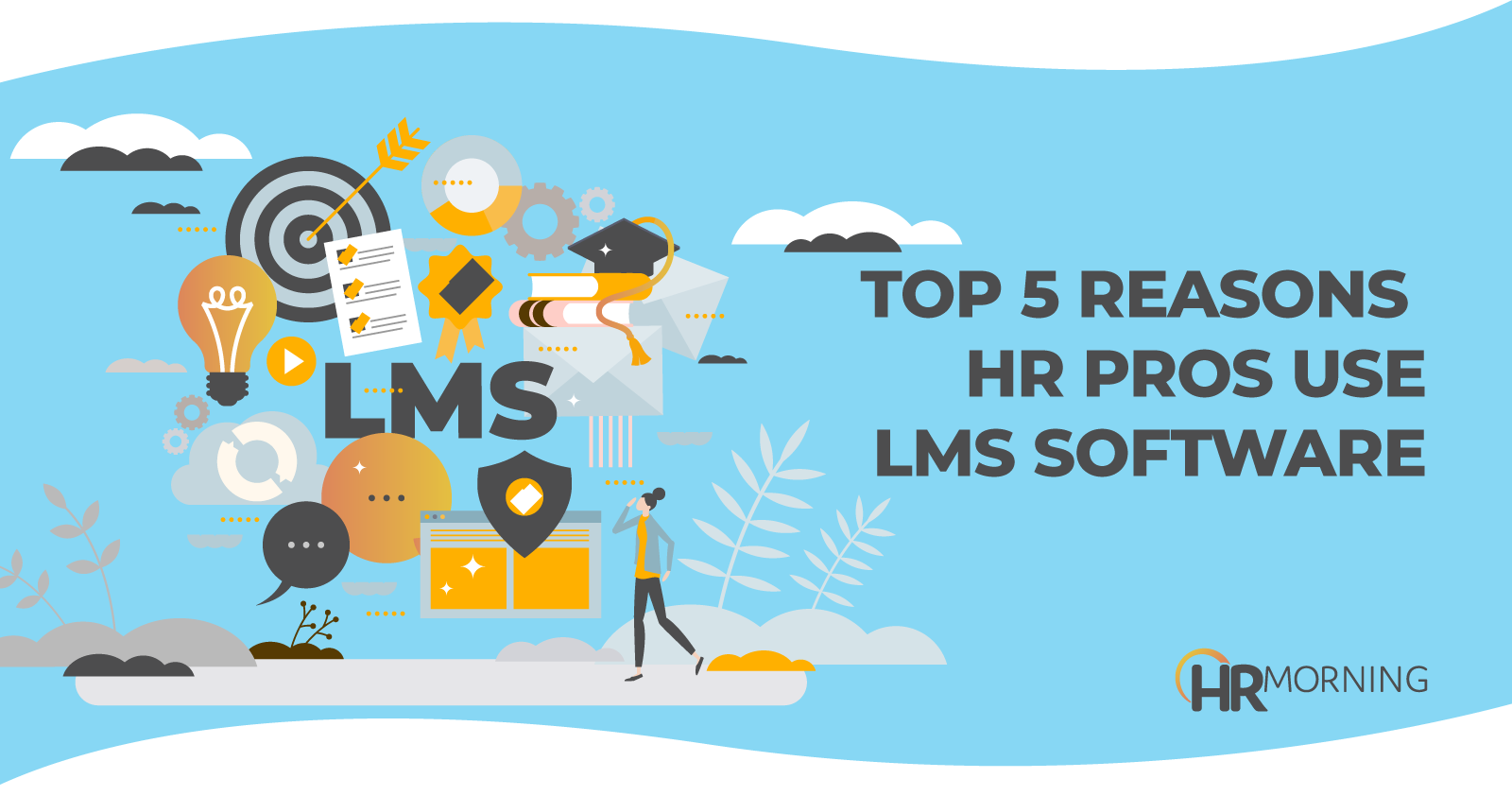5 ways LMS software makes HR pros’ jobs easier

HR pros find that learning management systems (LMS) software helps them develop their employees. And while LMS software comes with many benefits, what, specifically, are companies using it for?
Hint – it’s not just for retaining employees.
According to our HRMorning survey, HR pros feel that LMS platforms help them track important certifications (43%) or improve employee engagement with their learning initiatives (27%). But they’re using LMS software for other reasons.
Top 5 reasons for using LMS platforms
Here are the five main reasons companies have LMS software:
- Onboarding new employees
Seventy-five percent of our survey respondents use the LMS software to onboard new employees. LMS software provides ways for new hires to learn all about the company, as well as get up to speed in their role. They can also take specific courses that relate to new skills they’ll need for the job. HR or managers can upload a range of different files, such as a company manual or videos. They can also create a personalized learning path with targeted training for the new hire’s job.
- Upskilling/reskilling
HR pros know their employees want to grow their careers with the company, so 65% of them reported they use the LMS to provide upskilling opportunities. A personalized learning plan is a key feature that helps employees build their skills by completing a sequential prerequisite of courses. In addition, LMS platforms allow employees to select the courses that interest them, with a content library of specific topics. Employees can also take advantage of social learning and collaboration features by sharing and commenting on their colleagues’ content and posts.
- Management development
Sixty percent of HR pros currently have an LMS for developing management and leadership skills, according to our survey. Similar to upskilling, companies may want to consider specific employees as future managers or leaders (succession planning) so an LMS can help those employees learn new management skills, such as problem solving, conflict resolution, delegation or strategic planning. Most LMS platforms have course libraries that address those skills, and companies can develop their own content as well.
- Performance coaching
Employees with performance issues can often improve with training, as 40% of our survey respondents can attest. LMS software can integrate with performance management solutions, so if an employee receives a negative performance review, it can signal training needed in a particular skill or area.
- Certification/compliance management
A lot of industries require employees to stay certified either annually or semiannually, and 75% of our HR pros currently rely on their LMS to help them track these requirements. Many LMS platforms include certification management features, such as automatic reminders to employees for training, certification that show employee completes training and reporting.
Top 4 LMS platforms, according to HR pros
We also found that while there are many LMS software vendors out there, companies favor an LMS platform that’s built into their current HR or talent management software.
Here are the top four LMS platforms companies use (Note: they represent 70% of cloud-based solutions our survey respondents use):
- ADP
ADP is an HR software company with a heavy focus on payroll. However, it has a Learning Management module that’s part of its Talent Management Suite. It includes features, such as competency-based learning paths, social learning, blended learning (both on-demand and instructor-led training) and content libraries.
- Cornerstone LMS
Cornerstone is a talent management software that not only includes learning and development but other core features, such as recruiting, engagement and performance management. Its Cornerstone LMS module can be used for upskilling, compliance management and customer training. With Cornerstone LMS, managers can assign and track training, while employees can participate in virtual or in-person learning or collaborate with other learners from anywhere.
- LinkedIn Learning
LinkedIn Learning is an online platform intended for employee development. Managers or employees can evaluate the employee’s skills gaps or professional development needs, and LinkedIn Learning sends them recommended content based on those gaps. In addition, managers can also upload their content from their organization or from another LMS software. LinkedIn Learning has an interactive community where learners can watch courses together, share ideas via a Q&A page and access content created by their colleagues.
- Paylocity
Paylocity is HR software with payroll, benefits, time management and talent management features. With its LMS software, managers can assign training to individuals or a group of employees and set due dates for course completion. Employees who are subject matter experts in a particular area can create courses to share their knowledge in Paylocity’s social collaboration hub, Community. Additional features include automated workflows, mobile learning and progress tracking.
As noted above, aside from LinkedIn Learning, the other three solutions are HR or talent management solutions with LMS features built in rather than dedicated LMS software. It’s possible that HR pros would rather have one system that manages all of their HR functions rather than separate solutions. However, if they decide to purchase a dedicated LMS solution down the road, they may want to consider one that can integrate with their current HR software or other applications.
If you would like to learn more about our survey results, click here.

